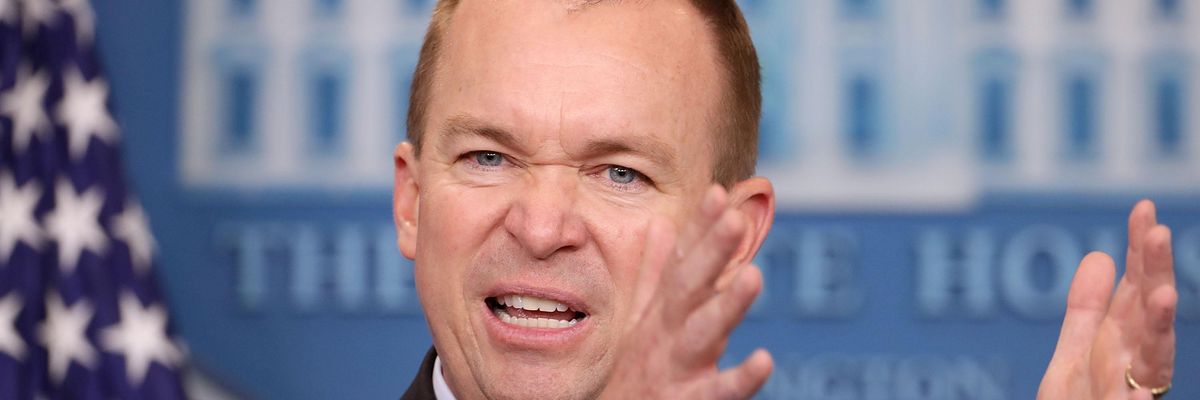Trumpcare may be dead again (for a while at least) on Tuesday, but Republicans now want to get serious about what they call "tax reform," but which critics are resolute in saying is just a major push to give the nation's corporation and wealthiest individuals another massive giveaway they don't need and certainly don't deserve.
A day ahead of the Trump administration's scheduled release of what it says will be a "detailed" tax plan, progressive policy groups are again warning the American people not to be fooled by rhetoric as they highlight estimates showing the likely proposal will cost the government trillions of dollars in revenue over the next decade and lead the way towards massive cuts in key social programs that help insulate low-income and working Americans from an economy already "rigged" in favor of the wealthy and powerful.
"The idea that this plan would help average Americans instead of the wealthy and big corporations has been a hoax all along," said Frank Clemente, executive director of Americans for Tax Fairness (ATF), which on Tuesday released an analysis showing that Trump's plan would likely leave a $5 trillion hole in the federal budget over the next ten years.
"This isn't 'tax reform,' it's just a big giveaway to millionaires and corporations, and it won't 'trickle down' to the rest of us," Clemente said. "It won't help small businesses, but it will help Wall Street hedge fund managers and real estate moguls like Donald Trump. This plan will not lead to robust job creation or economic growth, but its eye-popping cost will lead to deep cuts in Social Security, Medicaid, Medicare, and public education that will leave working families in the cold."
Meanwhile, Chye-Ching Huang and Joel Friedman, tax experts for the Center on Budget and Policy Priorities, highlight how maneuvers by the GOP-controlled Senate to relinquish deficit-neutral demands on tax cuts for the rich and corporations--a betrayal of their traditional "fiscal responsibility" mantra--is a clear signal that after millionaires, billionaires, and corporations receive their tax giveaways it will be right back to attacking the social safety net and the common good:
Last week, key Senate Republicans reached agreement to produce a budget resolution that authorizes $1.5 trillion in tax cuts over ten years and paves the way for using the reconciliation process to speed their passage. If recent tax proposals from President Trump and Republican congressional leaders are any guide, the tax cut that Congress will draft is likely to be heavily skewed toward high-income households, the group that has reaped most of the income gains of recent decades. And rather than requiring the $1.5 trillion cost to be offset through revenue-raising measures such as closing unproductive, inefficient, or low-priority tax breaks, the budget resolution would allow the tax cut's cost to add to future deficits, thereby exacerbating the nation's long-term fiscal challenges. Those higher deficits, in turn, would almost certainly fuel demands in coming years for budget cuts in a wide range of government programs, likely including programs that provide important services and benefits for tens of millions of low- and moderate-income Americans.
According to the ATF's analysis--based on recent media reports, earlier Trump statements, and other GOP tax plans--the White House's new tax cuts could total $6.7 to $8.3 trillion the next decade, leaving $3 to $5 trillion of which may not be paid for by closing other tax loopholes and/or by limiting tax deductions." Such a plan, the group said, is likely to:
- Provide massive tax cuts that largely benefit the richest Americans and biggest corporations--through direct tax cuts and indirectly through big cuts in corporate taxes, 80% of which benefit wealthier Americans, according to the non-partisan Tax Policy Center.
- Provide a modest middle-class tax cut, largely by doubling the standard deduction, although much of that could be taken away if the tax plan repeals the personal exemption and the head of household filing status.
- Not come close to being paid for by closing tax loopholes, which will likely result in deep cuts now or next year to Social Security, Medicare, Medicaid, public education and many other priorities working families depend on. These cuts were outlined in President Trump's FY2018 budget, which proposed $4.3 trillion in cuts to Social Security, Medicaid, public education and other non-defense programs; and in the House budget, which proposed $5.8 trillion in cuts to Medicare, Medicaid public education and other non-defense programs and that is awaiting floor action.
Reporting on Tuesday indicates that part of Trump's strategy to achieve support for his tax package will be to enlist the grassroots--and even Democrats--to sign on and back the plan. But as a new ABC News/Washington Post poll reveals, a large majority of U.S. voters already understand that the economic system, including the tax code, is skewed to help the rich and sets taxes that are too low, not too high, for the nation's powerful and cash-soaked corporations.
As former secretrary of labor Robert Reich wrote over the weekend, the U.S. should be raising corporate taxes, not lowering them.
"The rich aren't overtaxed. The wealthiest 1 percent in the U.S. pay the lowest taxes as a percent of their income and total wealth of the top 1 percent in any major country - and far lower than they paid in the U.S. during the first three decades after World War II, when the American economy grew faster than it's been growing since the Reagan tax cuts," wrote Reich. "But we do have a deficit in public investment - especially in education and infrastructure. And we do have a national debt that topped $20 trillion this year and is expected to grow by an additional $10 trillion over the next decade."
So, what the answer? "Raise taxes on big corporations and the wealthy," he concluded. "That's what rational politicians would do if they weren't in the pockets of big corporations and the wealthy."
